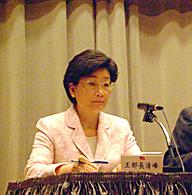Wang Ching-feng
- Machine translation, like DeepL or Google Translate, is a useful starting point for translations, but translators must revise errors as necessary and confirm that the translation is accurate, rather than simply copy-pasting machine-translated text into the English Wikipedia.
- Do not translate text that appears unreliable or low-quality. If possible, verify the text with references provided in the foreign-language article.
- You must provide copyright attribution in the edit summary accompanying your translation by providing an interlanguage link to the source of your translation. A model attribution edit summary is
Content in this edit is translated from the existing Chinese Wikipedia article at [[:zh:王清峰]]; see its history for attribution. - You may also add the template
{{Translated|zh|王清峰}}to the talk page. - For more guidance, see Wikipedia:Translation.

20 May 2008 – 12 March 2010
Tseng Yung-fu
Tainan City, Taiwan
Wang Tsing-fong (Chinese: 王清峰; pinyin: Wáng Qīngfēng; Pe̍h-ōe-jī: Ông Chheng-hong; born 1 January 1952 in Tainan City) is a Taiwanese lawyer and politician.
Early life
Wang graduated from the Taipei First Girls' High School and received her bachelor's and master's degrees in law from National Chengchi University.[1]
Early career
Wang has been working as a lawyer since graduation. Since 1987, she has been organising activities to give legal support to help Taiwanese comfort women, child prostitutes, and rape victims.
Political career
She was nominated as a member of the Control Yuan by President Lee Teng-hui, serving in this position from April 1993 to October 1995.
In October 1995, Wang resigned her Control Yuan position and accepted the invitation from Chen Li-an to be his partner in their 1996 ROC Presidential Election campaign. They finished last among the four candidates, winning 9.98% of the vote.
| 1996 Republic of China Presidential Election Result | ||||
|---|---|---|---|---|
| President Candidate | Vice President Candidate | Party | Votes | % |
| Lee Teng-hui | Lien Chan |  Kuomintang Kuomintang | 5,813,699 | 54.0 |
| Peng Ming-min | Frank Hsieh | Democratic Progressive Party | 2,274,586 | 21.1 |
| Lin Yang-kang | Hau Pei-tsun | Independent | 1,603,790 | 14.9 |
| Chen Li-an | Wang Ching-feng | Independent | 1,074,044 | 9.9 |
| Invalid/blank votes | 117,160 | |||
| Total | 10,883,279 | 100 | ||
In 2004, as an independent, Wang served as a member in the highly controversial 3-19 Shooting Investigation Committee organised by the pan-blue coalition after its loss in the 2004 ROC Presidential election. In 2005 Wang secured a seat in the National Assembly of the Republic of China after the Democratic Action Alliance [zh] led by Chang Ya-chung, her recommending party, won 1.68% vote in the 2005 Republic of China National Assembly election and thereby secured five seats.[2] Wang resigned her seat immediately upon taking office.[3]
ROC Justice Ministry
Wang was nominated by President Ma Ying-jeou to be Minister of Justice after he won the 2008 ROC Presidential Election. On 10 March 2010, Wang announced that she is in favour of the eventual abolition of the death penalty; she emphasised that she would not allow any executions during her tenure. Her speech aroused public protests led by relatives of murder victims, such as the entertainer Pai Bing-bing (whose daughter was kidnapped and murdered in 1997). There were calls for her to step down. Wang quit her ministerial position the next day.[4]
References
- ^ "Minister of Justice WANG Ching-feng". Minister of Justice. 15 March 2010. Archived from the original on 4 March 2016.
- ^ Ko, Shu-ling (15 May 2005). "DPP wins surprise victory in election". Taipei Times. Retrieved 7 January 2019.
- ^ Ko, Shu-ling (31 May 2005). "National Assembly has first meeting". Taipei Times. Retrieved 7 January 2019.
- ^ "Taiwan: Justice Minister Threatens to Resign Rather Than Approve Executions". Archived from the original on 2016-03-04. Retrieved 2013-09-16.
External links












